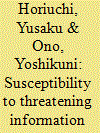| Srl | Item |
| 1 |
ID:
190882


|
|
|
|
|
| Summary/Abstract |
A growing number of news articles and politicians’ statements treat refugees as potential terrorists. However, existing research has yet to thoroughly examine how threatening information about refugees affects natives’ attitudes toward refugee resettlement. To address this issue, we conducted a survey experiment in Japan, where the number of refugees accepted each year is extremely small, despite the rapid increase in news about refugees. Our results show that opposition to refugee resettlement is associated with its proximity. Specifically, we find two types of NIMBY (not-in-my-backyard) attitudes – within-country and between-country NIMBY-ism – toward refugee resettlement among Japanese people. Additionally, respondents become more strongly opposed to refugee resettlement when exposed to threatening frames that depict refugees as harmful, regardless of the proximity to threats and potential resettlement. These findings add nuance to the scholarly literature on threat perceptions and public attitudes in intergroup relations. First, our findings suggest that NIMBY attitudes toward refugee resettlement (shown in Ferwerda, Flynn & Horiuchi, 2017) are not a US-only phenomenon. Second, we provide empirical evidence to support the theory that subjectively perceived threats affect people’s hostility toward out-group members, even in the absence of actual threats. Finally, we contribute to the recent debate on the effects of proximity to threats. Our results support the argument that the psychological effects of terrorism on negative attitudes toward immigrants and refugees are more pronounced in homogeneous societies, irrespective of proximity to the threat.
|
|
|
|
|
|
|
|
|
|
|
|
|
|
|
|
| 2 |
ID:
189051


|
|
|
|
|
| Summary/Abstract |
Native allies are critical to the success of immigrants’ social movements in East Asian countries because of their relatively small number. However, it remains unclear whether advocacy messages from natives or from immigrants are more effective in changing natives’ attitudes toward supporting immigrant-oriented policies. We hypothesize, from the perspective of social identity theory, that the persuasiveness of a message varies, depending on the identity of the group sending the message—that is, whether it is an in-group or an out-group. To test this hypothesis, we conducted a survey experiment using the case of granting local voting rights to immigrants in Japan. We found that support for granting local voting rights to immigrants does not decrease when the Japanese hear advocacy messages from the Japanese, however, it does decrease when they hear messages from Korean immigrants who stand to benefit from the granting of local suffrage. These results suggest that natives’ advocacy messages may increase support for immigrants.
|
|
|
|
|
|
|
|
|
|
|
|
|
|
|
|
| 3 |
ID:
189052


|
|
|